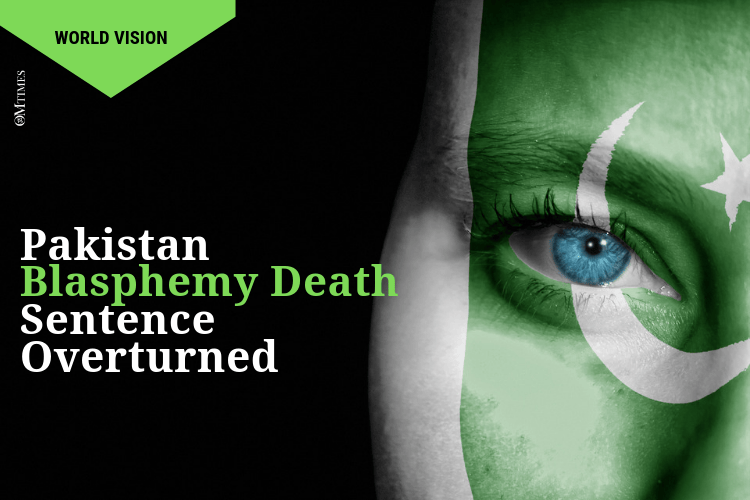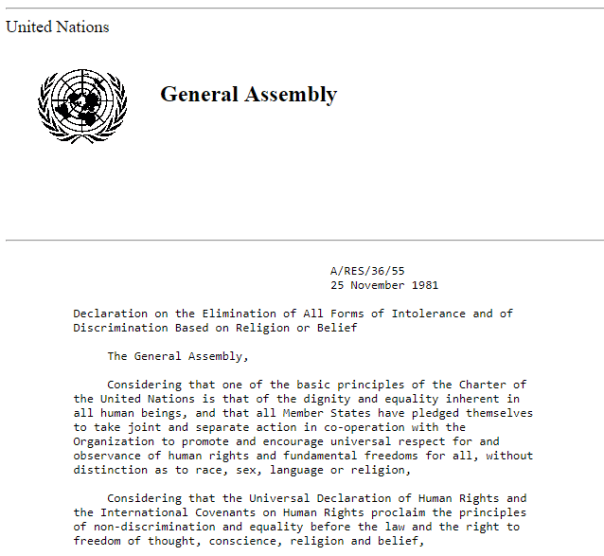Pakistan Blasphemy Death Sentence of Asia Bibi Overturned

On October 29, 2018, the Supreme Court of Pakistan reversed the decision of lower courts sentencing to death Asia Bibi, a Christian mother of four for blasphemy. After 3,422 days of imprisonment in solitary confinement, the Supreme Court reversed a 2010 lower court verdict. Asia Bibi is now in seclusion and will probably leave the country as some 60 persons in Pakistan have been murdered since 1990, accused of blasphemy.
The Pakistan Blasphemy Death Sentence of Asia Bibi Is Overturned: A One-time Event or a Trend Toward Justice?
Asia Bibi, a Christian mother of four accused of blasphemy. Her case had drawn attention in Pakistan. Salman Taseer, the Governor of Punjab Province, was murdered by his bodyguard for commenting on the Bibi case and suggesting that the blasphemy laws should be modified or abolished. Shahbaz Phatti, the Central Government’s Minister for Minorities likewise was murdered for commenting on the Asia Bibi case. Already, there are angry groups in the streets near the homes of the Supreme Court justices attacking their decision. The military has been called to protect them, but radical Islamist groups such as the Tehreek-i-Labaik may incite more demonstrations.
During the presidency of General Zia ul-Haq (1977-1988) the Hudaad (Punishment) Ordinances were introduced in 1984 which “define crimes against Islam”. In Hudaad cases, the testimony of a non-Muslim is considered worth half that of a Muslim. Section 298-B and 298-C of the Pakistan Penal Code dealing with blasphemy singles out the Ahamadiyya as “non-Muslim”, considered by Sunni theologians as heretics, while the Ahmadi consider themselves as the final flowering of Islam. Shi’a Muslims have also been arrested for blasphemy as the law has been expanded to include defiling of the Prophet’s family and companions. (1)
Section 298-C is very broad. “Whoever by words, either spoken or written or by visible representation, or by any imputation, innuendo, or insinuation, directly or indirectly, defiles the sacred name of the Holy Prophet Mohammad (Peace be upon him) shall be punished with death.”
While the blasphemy laws were originally directed against the Ahmadi, some of whom hold a high position in society, the blasphemy laws are increasingly used against Christians who are often the rural poor, having been converted from low caste Hindus prior to Independence. While there is a small Protestant elite, the bulk of Christians in Pakistan are Roman Catholic and rural poor. Those in cities often carry out menial work, sweeping streets, garbage collection. Thus, when accused, it is difficult for them to pay a lawyer, and lawyers who have taken the defense have been threatened with death. In the climate of intolerance which prevails and in view of threats and pressures brought on the judiciary, it has become nearly impossible to obtain a fair hearing for those charged under the blasphemy laws.
In practice, the blasphemy charges are often used to mask more material motivations, often disputes over land ownership and land use as well as a personal vendetta. The failure of successive Governments to bring under control the Islamist extremist movements in the country has strengthened their hands to victimize individuals and groups with impunity.
The Association of World Citizens (AWC) is opposed to the death penalty in all cases, which certainly includes the “crime of blasphemy”. The AWC has appealed to the authorities of Pakistan to repeal the blasphemy laws and raised the Asia Bibi case in the human rights bodies of the human rights bodies of the United Nations (UN) in Geneva. There can be no doubt that freedom of thought, conscience, religion or belief is of a fundamental character and arises from the inherent dignity and worth of the human person.
In 1981, after almost 20 years of formulation and reformulation, the UN General Assembly adopted the Declaration on the Elimination of All Forms of Intolerance and Discrimination Based on Religion or Belief (GA Res 55, November 25, 1981). The Declaration represented the efforts of a relatively small group of governments and nongovernmental organizations (NGOs) both religious and secular such as the AWC. The UN Commission on Human Rights, continued by the Human Rights Council, has a Special Rapporteur on Freedom of Religion and Belief who makes reports largely based on information provided by NGOs. The existence of the Special Rapporteur and thus an automatic agenda item allows NGO representatives to highlight issues as they develop. An example is my 2008 intervention at a time when the Government of Indonesia was about to follow the pattern of Pakistan in its attacks on the Ahmadiyya.
“Mr. President, One of the important functions of NGO representatives in the work of our Council is that of ‘early warning’. By calling attention at the first signs of danger, our hope is that governments and NGOs working together in a cooperative spirit can uphold universally recognized human rights standards. Our aim is to avoid violence and to prevent an escalation of tensions which often take on a life of their own.
It is in this spirit that we raise what seems to be a growing pressure against the Ahmadiyya branch of Islam in Indonesia. We raise it under agenda item 9 as the defamation of a religion can be understood as attacks without reasoned discussion on the doctrine of a religion, on the founder of a religious movement or on the current representatives of a religious movement.
Thus, attacks on the Ahmadiyya are often focused on the founder of the movement: Hazrat Mirza Ghulam Ahmad who is considered by his followers as the promised Madhi who is to mark the birth of a new era. The movement began in the early 1880s in what was then British India’s Punjab province, now split between India and Pakistan.
From there, the movement has spread to many different countries, including Indonesia. In normally tolerant Indonesia, the Ahmadiyya movement has carried on its activities of worship, education and social services in relative peace for many years.
The causes of the recent flare-up of defamation against the founder and the charges of being heretics against the Ahmadiyya followers need to be looked at carefully if we are to prevent what seems to be some violent attacks against flowers followed by police closings of places of worship. The constant defamation of the founder should serve as a warning. In cooperation with the Government of Indonesia, the Council must do all it can to encourage the restoration of mutual understanding among people of different religious movements. Thank you, Mr. President”
The AWC welcomes the decision of the Supreme Court of Pakistan. We will have to watch if it is a one-time event not to be repeated soon or if, more hopefully, it is a sign of a trend toward justice on the part of the new Pakistan Administration.
Note: (1) See Charles H. Kennedy. “Repugnance to Islam. Who Decides? Islam and Legal Reform in Pakistan” in International and Comparative Law, Vol. 41, Part 4, p. 772, October 1992.
You will also enjoy Is Spirituality Liberal or Conservative?
About the Author
Rene Wadlow is the President of the Association of World Citizens, located in Geneva, Switzerland.
Rene Wadlow is the President of the Association of World Citizens, located in Geneva, Switzerland.






